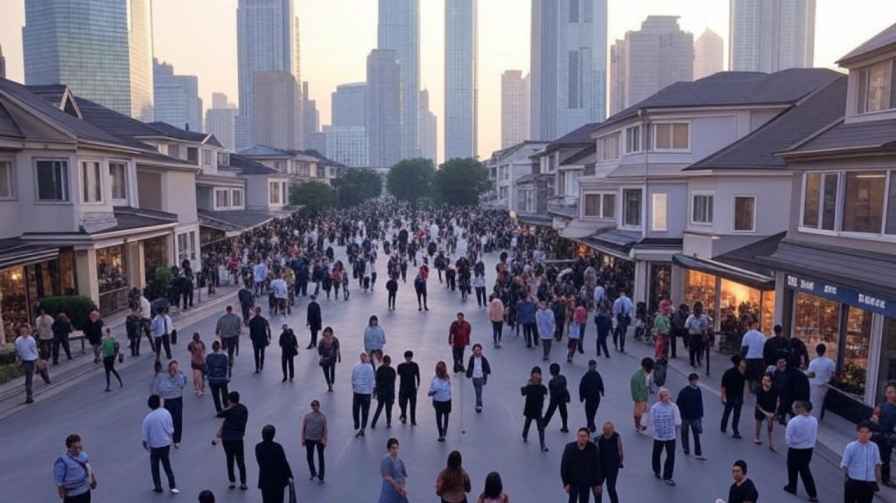The Illusion of Prosperity
In a bustling city adorned with skyscrapers and lavish shopping complexes, the facade of prosperity often masks the underlying struggles of its citizens. While affluence shines in the grand architecture and luxurious lifestyles of the privileged, the harsh realities of economic disparity remain conspicuous in the overcrowded streets and struggling neighborhoods.
The relentless pursuit of wealth has only served to entrench social inequalities, making it increasingly difficult for the underprivileged to break free from the cycle of financial hardship. Instead of uplifting communities, unchecked urban expansion has exacerbated the gap between the rich and the poor, pushing many into despair as they grapple with rising living costs and stagnant wages.
Despite these challenges, there remains hope. Thoughtful policies and inclusive growth strategies can alleviate the burdens faced by the marginalized.
Vocabulary Words from the passage with contextual explanation
(1) Bustling
- Meaning: Full of energetic and noisy activity.
- Context Explanation: The city is described as bustling, meaning it is lively and crowded with people, businesses, and movement.
- Example Sentence: The bustling market was filled with vendors calling out to customers.
(2) Adorned
- Meaning: Decorated or made more beautiful and attractive.
- Context Explanation: In the passage, the phrase “a bustling city adorned with skyscrapers and lavish shopping complexes” means that the city is decorated with impressive buildings and modern structures, giving it a grand and luxurious appearance.
- Skyscrapers are very tall, multi-story buildings typically found in cities.
- Example Sentence: The bride was adorned in a stunning gown with intricate embroidery and sparkling jewelry.
(3) Façade
- Meaning: A deceptive outward appearance; a false, superficial or artificial appearance
- (ii) the front of a building.
- Context Explanation: In the passage, “the facade of prosperity often masks the underlying struggles of its citizens” means that while the city appears wealthy and developed on the surface, this appearance is misleading because many people still struggle with poverty and inequality. The word facade is used here metaphorically to highlight how the outward display of prosperity hides deeper social and economic issues.
- Example Sentence: The politician maintained a facade of confidence, even though he was deeply worried about the election results.
(4) Affluence
- Meaning: Wealth; the state of having a lot of money and material goods.
- Context Explanation: In the passage, “While affluence shines in the grand architecture and luxurious lifestyles of the privileged” refers to how the wealth of the rich is visible through magnificent buildings and extravagant living, contrasting with the struggles of the less fortunate. The word affluence is used to emphasize the sharp divide between the wealthy and the underprivileged in the city.
- Example Sentence: The affluence of the neighborhood was evident in its grand mansions and luxury cars.
(5) Conspicuous
- Meaning: Easily noticeable or standing out.
- Context Explanation: The contrast between wealth and poverty is conspicuous, meaning it is highly visible and cannot be ignored.
- Example Sentence: His conspicuous red coat made him stand out in the crowd.
(6) Economic Disparity
- Meaning: The significant difference in wealth and income between different social or economic groups.
- It highlights the gap between the rich and the poor, showing how wealth is unevenly distributed in society.
- Example Sentence: The economic disparity between urban elites and rural workers continues to grow.
(7) Relentless
- Meaning: Continuing without stopping or showing any signs of weakness; persistent and determined.
- Context Explanation: In the passage, “The relentless pursuit of wealth has only served to entrench social inequalities,” the word relentless describes how people continuously chase wealth without pause, often worsening social inequalities.
- Example Sentence: The relentless heat of the desert made survival nearly impossible.
(8) Entrench
- Meaning: To establish something so firmly that it is difficult to change.
- Context Explanation: Social inequalities have entrenched themselves, meaning they have become deeply rooted in society, making it hard for poor people to escape financial hardship.
- Example Sentence: Traditional beliefs are often entrenched in society, making them hard to change.
(9) Exacerbate
- Meaning: To make a problem worse.
- Context Explanation: Instead of solving economic issues, urban expansion has exacerbated them, meaning it has made the wealth gap even wider.
- Example Sentence: The lack of medical facilities exacerbated the spread of the disease.
(10) Despair
- Meaning: A feeling of complete hopelessness.
- Context Explanation: Poor people fall into despair because they struggle with financial problems and rising costs, making them feel hopeless.
- Example Sentence: Losing his job left him in despair, unsure of what to do next.
(11) Grapple
- Meaning: To struggle or try hard to deal with a difficult situation.
- Context Explanation: Poor individuals grapple with high living costs, meaning they are struggling to manage or control these financial burdens.
- Example Sentence: The government is grappling with the challenge of unemployment.
(12) Stagnant
- Meaning: Not moving or improving, remaining the same.
- Context Explanation: Stagnant wages mean that salaries are not increasing, even though the cost of living is rising, making life harder for the poor.
- Example Sentence: His career remained stagnant for years without any promotions.
(13) Alleviate
- Meaning: To reduce or lessen the intensity of pain, suffering, or a problem.
- Context Explanation: In the passage, the word alleviate is used to suggest that well-planned policies and strategies can help reduce the struggles and difficulties of underprivileged people. It implies that these measures can make their hardships more manageable.
- Example Sentence: The new government scheme aims to alleviate poverty by providing financial aid to struggling families.



